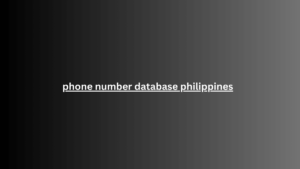Measures that will help you improve security in WordPress
Posted: Sat Dec 14, 2024 9:12 am
Taking into account all of the above, and knowing that we like to write articles with lists of tips on web topics, here are some basic recommendations to improve security in WordPress :
Choose a unique and specific username . A common phone number database philippines mistake is to use 'admin' as a username. Doing so is like handing your website's head over to hackers on a silver platter. Our advice is to try to choose a name that is easy to remember, but specific enough to avoid conventions.
Use strong and unique passwords . You probably don’t use “123456” as your password, right? RIGHT? Nowadays, there are a lot of websites that help us create secure passwords, and even most services that ask us to create a password have systems in place to measure the strength of the password and give us feedback before we decide to define it as our own. However, a useful tip is to use a combination that includes numbers, uppercase, lowercase, and some special character like among others.

Implement temporary lockouts after several failed login attempts . A very interesting option to make brute force attacks more difficult is to limit logins. This means that, for example, we can make a user locked out for 5 hours after entering the wrong password 3 times.
The number of attempts and the lockout hours can be easily configured with security plugins such as those we will see later. Tip: If you are the only one who is going to log in to WordPress, a lockout after three attempts with a long lockout time period may be advisable, since it is more difficult for you to make a mistake. If your client is going to have access to WordPress to create content, it may be advisable to set a slightly more flexible limit. In the end, it is about frustrating hackers' automations and putting limits on their brute force.
Choose a unique and specific username . A common phone number database philippines mistake is to use 'admin' as a username. Doing so is like handing your website's head over to hackers on a silver platter. Our advice is to try to choose a name that is easy to remember, but specific enough to avoid conventions.
Use strong and unique passwords . You probably don’t use “123456” as your password, right? RIGHT? Nowadays, there are a lot of websites that help us create secure passwords, and even most services that ask us to create a password have systems in place to measure the strength of the password and give us feedback before we decide to define it as our own. However, a useful tip is to use a combination that includes numbers, uppercase, lowercase, and some special character like among others.

Implement temporary lockouts after several failed login attempts . A very interesting option to make brute force attacks more difficult is to limit logins. This means that, for example, we can make a user locked out for 5 hours after entering the wrong password 3 times.
The number of attempts and the lockout hours can be easily configured with security plugins such as those we will see later. Tip: If you are the only one who is going to log in to WordPress, a lockout after three attempts with a long lockout time period may be advisable, since it is more difficult for you to make a mistake. If your client is going to have access to WordPress to create content, it may be advisable to set a slightly more flexible limit. In the end, it is about frustrating hackers' automations and putting limits on their brute force.